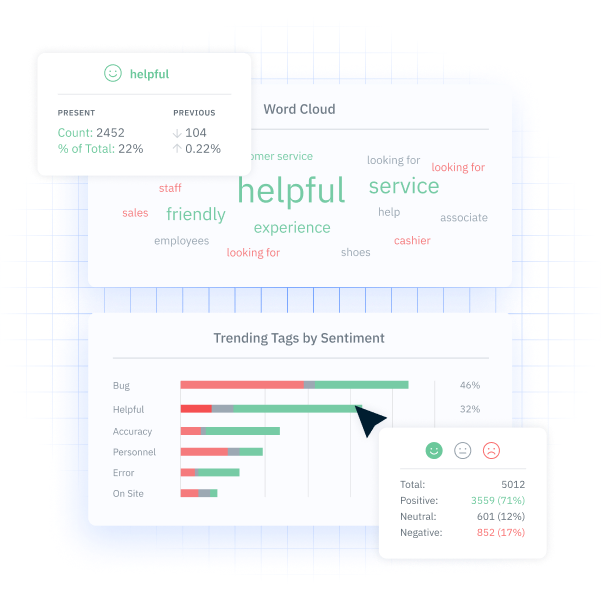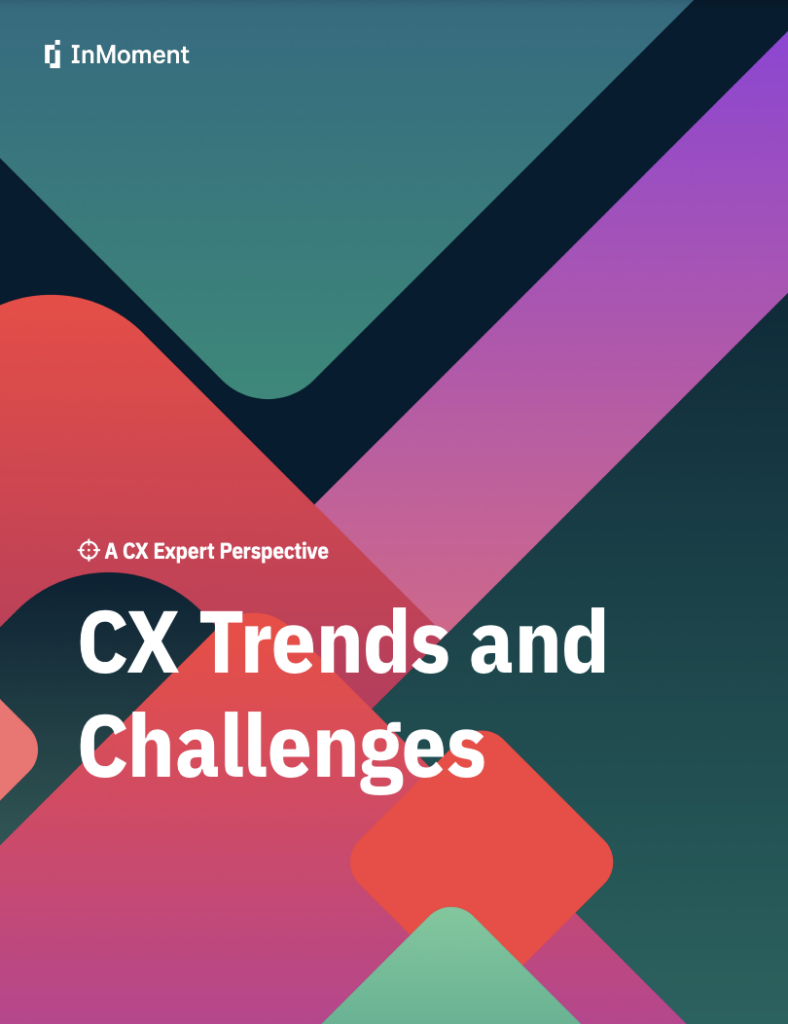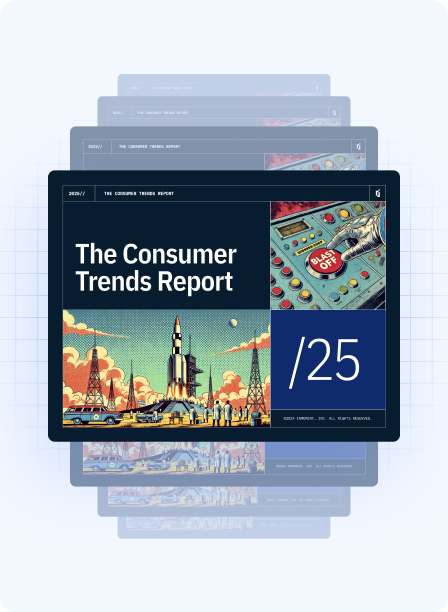Social Media Intelligence to Stay Competitive and Engage Customers
Customers are increasingly relying on social media to decide which brand to trust. With social media intelligence, you can analyze their online behavior and expectations to uncover valuable insights and growth opportunities.
Your social media channels aren’t just for scrolling through your feeds. With 74% of consumers relying on social media to guide their purchasing decisions, these platforms host valuable customer experience data. Social media intelligence is a powerful tool for leveraging this data to make informed business decisions.
What is Social Media Intelligence?
Social media intelligence is the analysis of data from social media conversations to guide marketing strategy. Your brand can better connect with your audience by tracking trends in online conversations around your product and industry.
For example, identifying negative sentiment toward your latest feature can help you spot areas for improvement. It’s also possible that your product is fine but your team is marketing it to the wrong demographic. As a result, these insights also enable effective marketing and lead generation.
Here’s a breakdown of the four key components of social media intelligence:
- Monitoring
- Data Collection
- Data Analysis
- Actionable Insights
Monitoring
Monitoring your social media channels is the first step in identifying and analyzing audience activity. What are your target customers talking about? What are their opinions on your brand and your competitors? How do they feel about your products and services? You can answer these questions by monitoring brand mentions and keywords on platforms like Facebook, Instagram, and X (formerly Twitter).
Data Collection
Collecting data is necessary for generating analytical insights from social media conversations. InMoment’s comprehensive social listening tool can help pull mentions of your brand and competitor, track relevant keywords, and connect data from various channels in one place. The regular, real-time data collection ensures you have a rich dataset for the analytical phase.
Data Analysis
Analysis is at the core of social media intelligence, enabling you to capture AI-enabled insights into customer behavior. For example, you can leverage sentiment analysis algorithms to understand public opinion around your brand. You can execute similar algorithms on competitor data to identify differences in online perception.
Actionable Insights
Actionable insights are the fruit of your analytical labor, showing you how to stay competitive and win over more customers. These insights help you take immediate and effective action for feature improvements or a better marketing campaign. The main aim is to invest in activities that increase customer loyalty and engagement.
How Does Social Media Intelligence Differ from Social Media Listening and Social Media Monitoring?
Social media intelligence, social listening, and social monitoring are used interchangeably. However, they serve different purposes for brands looking to understand online conversations.
- Social Media Intelligence is the comprehensive collection and analysis of social media data for actionable insights. It helps brands analyze customer sentiment, trends, and competitors to make data-driven business decisions.
- Social Listening is the analysis of social media conversations around your brand, product, or service. It helps businesses see what customers are talking about to identify opportunities and pain points.
- Social Media Monitoring is the tracking of brand and product mentions through keywords and hashtags. Social media monitoring enables brands to find customer queries and complaints so they can provide immediate responses.
Benefits of Social Media Intelligence
- Stronger Customer Relationships
- Lead Generation
- Staying Competitive
- Proactive Crisis Management
Social media intelligence helps unlock valuable insights into customers, prospects, and competitors. Key benefits include:
Stronger Customer Relationships
You may have the best customer feedback questionnaire for collecting structured CX data. However, the reality is that customers are more likely to be honest and open about their experiences on social media.
Listening to their online voice ensures you better understand your customers’ expectations. You get to capture honest insights to deliver more value, which in turn helps build stronger relationships and brand loyalty.
Lead Generation
Social media intelligence provides insights that help tailor your marketing efforts to your target audience.
For example, a fashion retailer can leverage data analysis to identify demographics expressing interest in its premium suits and dresses. The retailer can invest in targeted ad campaigns to attract these user profiles and convert them into valuable customers. This effective lead generation also helps increase your market share as your campaign draws in more prospects.
Staying Competitive
Your competitors’ social media activity highlights opportunities to improve your own brand. Tracking competitor mentions keeps you in the loop regarding key developments and issues. You can use this information to improve on their current offerings or fulfill a need they are neglecting.
For example, let’s say several comments and posts are complaining about the use of leather in your competitors’ handbags. You can leverage this opportunity to promote your vegan fashion items to disgruntled users. The resulting competitive edge will help you win over customers to your side.
Proactive Crisis Management
Social media intelligence provides real-time monitoring of sentiment and conversations around your brand. By identifying negative trends early, you can address issues proactively before they escalate.
For example, if you identify growing frustration about a bug in your app, you can release a prompt update to reassure customers. This practice helps build consumer trust and supports brand reputation management efforts.
How is Artificial Intelligence Used for Social Media?
- Sentiment Analysis
- Content Creation
- Customer Engagement
- Analytics and Reporting
Artificial Intelligence (AI) enables social media intelligence by automating crucial tasks and uncovering CX insights. Primary applications of AI for businesses include:
Content Creation
AI helps businesses streamline various tasks, including content creation and scheduling. Generative AI drastically reduces the time it takes to produce impactful content that engages your target audience. Meanwhile, automation enables quick and effective scheduling of posts for enhanced interactions.
InMoment’s social media management tool tracks trending keywords and topics to generate fresh, engaging content. As a result, it helps you stay relevant to your audience while saving time that you can invest in other operations.
Sentiment Analysis
AI-powered sentiment analysis highlights customer feelings towards your products, services, or brand. It categorizes comments, posts, or social media content as positive, neutral, or negative. This categorization is useful for filtering out user profiles and managing their experiences.
For example, you can quickly identify customers expressing negative sentiments to resolve their issues. Monitoring customer health and journeys regularly helps companies reduce churn by over 34% for at-risk clients. Therefore, sentiment analysis helps boost retention by keeping businesses up-to-date on customer behaviors and reactions.
Customer Engagement
Chatbots and virtual assistants improve engagement by instantly addressing customer queries. With a comprehensive knowledge base, they can even guide customers through complex processes without human intervention.
AI-powered chatbots learn from customer questions to provide targeted responses and recommendations. InMoment’s Active Listening™ is a conversational AI agent that provides context-aware follow-up questions to engage customers. As a result, it enables detailed feedback collection to help businesses make informed decisions.
Analytics and Reporting
AI simplifies analyzing large volumes of social media data to generate actionable insights. It helps you understand content performance, trends, and demographics to make data-driven decisions.
For example, analytics can show you which type of content receives the most engagement to help you optimize marketing campaigns. Similarly, it can highlight products receiving the most attention to guide inventory decisions. Visualizing these insights and sharing them with stakeholders can help brands track the effectiveness of their social media management.
How are CX Teams Benefiting from Social Media Intelligence?
- Competitor Analysis
- Reputation Management
- Trend Analysis
- Targeted Outreach
CX teams collaborate with multiple departments to improve customer experiences. Their cross-functional nature makes them a great fit for social media intelligence. Key benefits for CX teams include:
Competitor Analysis
Social media intelligence highlights competitors’ strengths and weaknesses. This analysis empowers CX teams to identify gaps in the market and proactively address them.
For example, CX teams in an organization can discover potential pain points by tracking competitors’ customer feedback. They can use this information to resolve issues before they affect their own customers. Additionally, they can position their brand as a more reliable alternative, helping them acquire new clients.
Reputation Management
Social networks can amplify wins and crises for brands. Therefore, staying on top of conversations and tracking customer sentiment is essential for brand reputation management.
Analyzing comments, reviews, and brand mentions can help CX teams detect crises early and manage them before it’s too late. It also enables them to highlight their wins and demonstrate their value through testimonials. This approach builds customer trust and enhances the company’s public perception.
Trend Analysis
Social media intelligence tools track trending topics and emerging themes. This analysis provides CX teams with valuable insights into customer interests and behaviors.
For example, a fitness app’s CX team might notice a rising interest in mindfulness and meditation. This trend could guide the development of new app features or content to align with customer demands. As a result, trend analysis allows CX teams to position their company as a relevant business that understands modern customer needs.
Targeted Outreach
CX teams leverage social media intelligence to identify specific demographics for targeted outreach. Positive interactions with these groups can strengthen loyalty and turn satisfied customers into brand advocates. For example, your CX team can identify the top influencers frequently mentioning your brand and contact them for a collaboration.
Social Media Intelligence Tools
- InMoment
- Mentionlytics
- Hootsuite
- Sprout Social
- Brandwatch
- Sprinklr
A social media intelligence tool makes it easy to better understand customer expectations. It handles everything from social media monitoring to data analysis. Here are six of the best tools to help you choose the right one for your business needs.
InMoment
InMoment’s XI Platform software offers a comprehensive social media intelligence solution. Unlike other platforms, it lets you control how frequently you want to pull and analyze data from platforms like Facebook, Instagram, and X. This level of control is key to building rich customer experience datasets.
The XI Platform also leverages sentiment analysis to provide insights into customer feelings around your brand. This analysis helps you identify disgruntled customers so that you can work on retaining them before it’s too late. In the XI Platform, you can also track trending keywords that can help you identify the biggest impacts on your customer experience.

The ability to track keywords and brand mentions means you can keep an eye on competitor activity. This competitive analysis empowers your CX teams to learn from their strengths and capitalize on their weaknesses.
For example, if your competitor is going through a PR crisis due to a recent data breach, you can use this opportunity to gain a competitive edge. Your marketing teams could communicate the superiority of your data protection technology.
Finally, InMoment’s social media intelligence tool enables high-quality lead generation. The insights gained from data analysis can highlight user profiles interested in your brand or offerings.
By targeting these profiles with effective marketing, you can convert them into valuable customers. Similarly, the tool can help you identify top influencers in your space so that you can work with them to boost your brand reputation.
Mentionlytics
Mentionlytics allows businesses to monitor and analyze conversations on social media. Key features include real-time sentiment analysis, multi-channel monitoring, and competitor comparison reports. These features help companies make data-driven decisions to stay competitive and improve customer experiences.
Hootsuite
Hootsuite is a social media intelligence platform that combines data collection and analysis. Its Listening Basics feature allows businesses to track keywords and hashtags on social media channels. CX teams using Hootsuite to manage social media can leverage the InMoment integration to monitor comments and reviews in one place. The integration helps filter out the best reviews and share them on social media to enhance online reputation.
Sprout Social
Sprout Social is a versatile platform that helps brands track and analyze social media conversations in real-time. Its standout feature is a trend-identifying tool that generates a word cloud highlighting topics relevant to the brand and industry. This trend analysis is helpful for staying competitive and managing customer interactions.
Brandwatch
Brandwatch uses advanced search options to help CX teams monitor vast amounts of social media conversations. It also enables trend analysis, influencer identification, and crisis management. It offers multilingual support to help businesses with multiple global locations manage their social media presence.
Sprinklr
Sprinklr is a social media management tool that enables businesses to track mentions, trends, and competitor activity. It uses AI algorithms to perform sentiment analysis on user-generated content. This analysis helps brands understand customer emotions and tailor their marketing strategy accordingly.
Get Better Insights to Transform Your Customer Experience with InMoment
Your social media channels are a treasure trove of customer experiences. Unlocking this data can help you win over customers, move past competitors, and boost your bottom line. InMoment’s social media intelligence tool gives you the key to access and analyze this valuable data. Schedule a product tour today to see how it can transform social media management for your brand.
References
WebFX. 100+ Social Media Statistics You Should Know for 2024 (https://www.webfx.com/social-media/statistics). Accessed 11/26/2024.
InMoment. InMoment Market Pulse (https://www.linkedin.com/posts/weareinmoment_b2b-customersuccess-ai-activity-7251989745914818560-haGe?utm_source=share&utm_medium=member_desktop). Accessed 11/26/2024.





